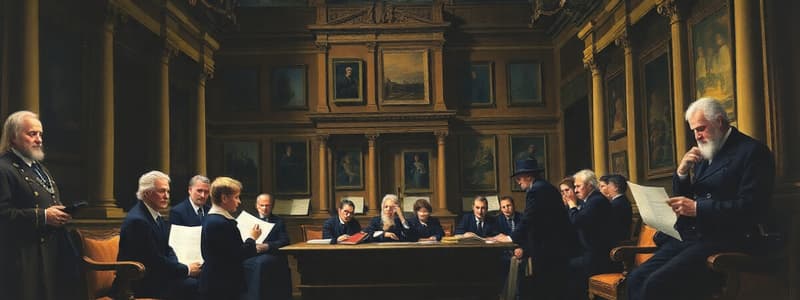Podcast
Questions and Answers
Which of the following best describes the role of the Cabinet committee in the legislative process?
Which of the following best describes the role of the Cabinet committee in the legislative process?
- Introducing the approved bill to the House of Commons or Senate for the first reading.
- Examining the bill after it has been drafted by lawyers, prior to broader approvals. (correct)
- Providing royal assent to the bill after it has passed through both the House and Senate.
- Drafting the initial idea for a bill after it is proposed by a Cabinet Minister.
During which stage of the legislative process is the principle and purpose of a bill debated in the House of Commons?
During which stage of the legislative process is the principle and purpose of a bill debated in the House of Commons?
- First Reading
- Third Reading
- Second Reading (correct)
- Committee Discussion and Report
Which of the following scenarios represents a key function of the parliamentary committee in examining a bill?
Which of the following scenarios represents a key function of the parliamentary committee in examining a bill?
- Analyzing the bill clause by clause and proposing amendments. (correct)
- Granting royal assent to the bill after it has been approved by both houses.
- Conducting a public opinion poll to gauge support for the proposed bill.
- Overseeing the initial drafting of the bill by legal professionals.
What action signifies the final step in a bill's journey to becoming a law?
What action signifies the final step in a bill's journey to becoming a law?
Which of the following steps occurs earliest in the process of a bill becoming a law?
Which of the following steps occurs earliest in the process of a bill becoming a law?
Flashcards
Cabinet
Cabinet
A body of appointed or elected officials, including ministers, each responsible for a specific government department.
Caucus
Caucus
A private meeting of members of a political party or cabinet members to discuss policy or strategy.
First Reading
First Reading
The initial presentation of a bill to the legislative body (House of Commons or Senate).
Committee Discussion of a Bill
Committee Discussion of a Bill
Signup and view all the flashcards
Royal Assent
Royal Assent
Signup and view all the flashcards
Study Notes
- A Cabinet Minister initially conceives an idea for a bill within the executive branch.
- The idea is presented to the Cabinet, composed of appointed and elected members, each responsible for a specific department as ministers.
- If the Cabinet approves, lawyers are tasked with drafting the bill.
- A Cabinet committee then scrutinizes the drafted bill.
- Subsequently, the Cabinet and caucus, in a private meeting, give their approval.
- The bill is then introduced in either the House of Commons or the Senate.
First Reading
- The drafted bill is formally introduced in the House of Commons.
- The bill is printed and distributed to all Members of Parliament.
Second Reading
- The House debates and votes on the bill's core principles, ethics, and purpose.
Parliamentary Committee
- A specialized committee, consisting of members with expertise in the bill's subject matter, examines the bill in detail.
- The committee may propose amendments or modifications to the bill.
- The committee reports its findings and proposed amendments back to the House of Commons for review.
Amending the Bill
- The House of Commons has the opportunity to modify or improve the bill.
- Following amendments, the bill is debated and voted upon once more.
Third Reading
- The House of Commons gets a final chance to review and amend the bill.
- If passed, the bill moves to the Senate.
Senate Review
- The Senate examines, debates, and may amend the bill, following a process similar to the House of Commons.
- If the bill originated in the Senate, it then goes to the House of Commons.
- Upon passing the Senate, the bill proceeds to the Governor General.
Royal Assent
- The Governor General signs the bill, granting royal assent, which officially enacts the bill into law.
- For provincial bills, royal assent is given by the Lieutenant Governor.
Studying That Suits You
Use AI to generate personalized quizzes and flashcards to suit your learning preferences.



